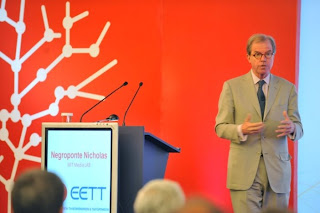
I remember during the UBB project, trying to prove the need for 1Gbps speed, the maximum bandwidth needed for heavy Internet usage was no more than 35Mbps and seriously there arent any heavy users in Greece yet. Technologically it is possible to offer 1Gbps, but the demand for that speed will be created in 10-15 years
But, for Greece, is it really the right time to bring up the fiber optic networks case? Will FTTH implementation take Greece out of the economic slump? Usually the impact of technology, i.e. broadband implementation on an economy is positive, adding growth based on macroeconomic fundamentals (Solow model) but also empirical studies. It is said that broadband brings more rapid growth in employment, the number of businesses overall, and businesses in IT-intensive sectors, relative to comparable communities without broadband. But still these are theoretical academic studies with little practical use.
However, the model should be different per market. Should a small country with a huge deficit right now, having the EU commissioner threatening and supervising its economy and public expenses, care about fiber optic networks? Is that the right investment to warm up and stimulate the economy? Is there a real interest from businesses and households into hight-speed broadband that turns the FTTH implementation into a one-way solution? Have the businesses and households already understood the value of the Internet, and how they can make money when Greece is still the EU lagger in broadband penetration? Rather worry, when there is no serious interest on SD IPTV that could easily run on ADSL or VDSL speeds. And still, the market is small, the young care more about their cell phone functionalities and the mobile internet rather than DTV or HDTV. If Greece was Finland or any other Scandinavian country, cloudy and cold most of the year, it would have made perfect sense, to offer HDTV asap.
Greece is a developed country with very good infrastructure and communications national coverage based on telephony (#29 in the world) and mobile wireless network (99.9%). The first half of 2009 Greece showed a 2.19% increase in the broadband penetration rate. Is that a positive sign of demand and interest to run after the FTTH?
However, there is no serious planning for DTV, when other EU countries have already launched such as Spain or are ready to launch the new service. Greece is a beautiful, touristic country focusing on services. Is that really critical to offer HDTV (havent heard of any other service needed) to the tourists, when the price of the hotels is skyrocketing every summer and the rate of the visiting tourists is going down? Certainly the tourist will not come to Greece to enjoy the HDTV. Are there any e-gov services that need a high speed connection to advance into the next level? How can a country in crisis, with more taxes coming up, afford a triple-play of 60-70 euros/month if we compare to the Portugese case, that is similar size to Greece? Why is the download speed a serious problem for the households that fiber will overcome? Instead, implement P2P policies and add value to the downloads
Rushing to migrate into an advanced technology without having serious services planning or making full use of the DSL could increase the digital or better the bandwidth divide between the rural and urban areas with its implications. Is there a serious national, individual and organisational level's benefit measured or are we following others? Is there a reasonable ROI for the investors?
What are the other priorities? From an insight view, a serious spending on redesigning the tax system, that could track all the illegal activities, shrinking the deficit, promoting and educating into e-gov services, adding more speed and equipment to the school labs, that to my experience they run on a '2Mbps' speed, a real obstacle when running a seminar on new technologies. Serious spending and supervising the EU funds spending and investing into SMEs projects.
In the end of the day, examine what the market wants and dont rush into building a fiber optic network that will start creating revenues much much later from what it is expected, causing another balack hole for the economy. Technologists should collaborate with economists and consult with countries that have already implemented the fiber network and understand the rationality. Revise the techno-economic study, including some serious technological planning, setting as first priority the social benefit and not the investors'. Support the FTTH case study with more social services, broadband stimulus applications proving the real need for high speed broadband service, supporting the rural areas of Greece i.e. the islands that to my opinion should be covered from mobile broadband solutions following similar developing counries model. Thus the price of the mobile broadband should go down and offered more widely to the ruaral areas. HSPA+ (21Mbps) is already offered in Greece.
Proper technological choices and services diversity could be the solution and serious thinking on what people really need, collaborating with the governement agencies and running surveys to rural and urban areas. A small group of people shouldnt decide on behalf of the majority, cause its a huge public expense per year and a political decision that could easily turn against them in the future (goverment, investors, technologists)if not carefully supported and planned with a serious economic and technological model. Greece needs an ecosystem than an advanced leading technology that will bring no serious economic growth, cause tge country is not ready for that.
stay tuned~



